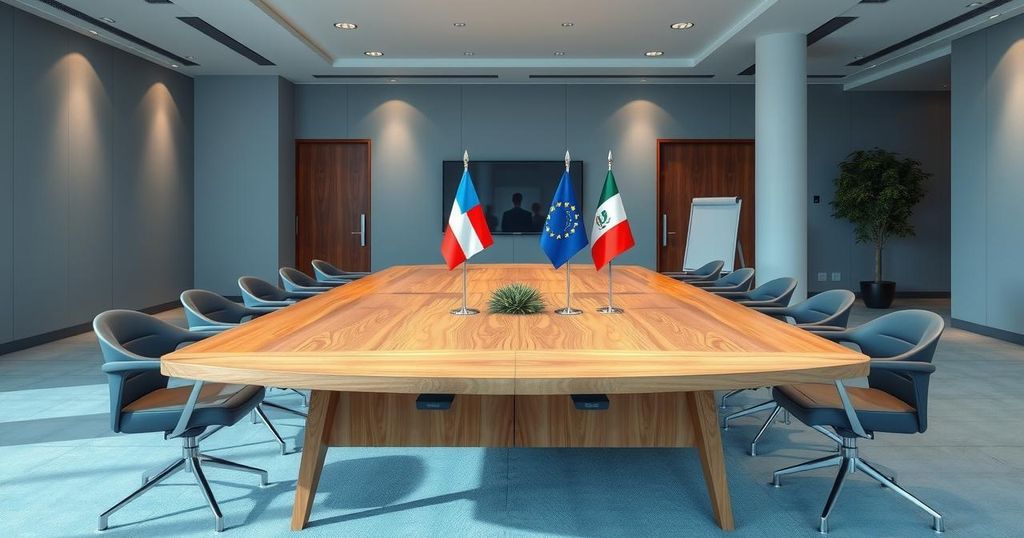President Tshisekedi of the DRC and President Kagame of Rwanda met in Qatar to address the security crisis in eastern DRC, marked by accusations of Rwandan support for the M23 rebellion. The meeting, mediated by the emir, resulted in a commitment to an immediate ceasefire and the importance of political dialogue, following unsuccessful peace talks in Angola. The discussions signify a possible shift towards negotiation amid ongoing international pressures and regional complexities.
On Tuesday, a significant meeting occurred between President Felix Tshisekedi of the Democratic Republic of Congo (DRC) and President Paul Kagame of Rwanda in Qatar, under the mediation of the emir. This meeting aimed to address the ongoing security crisis in eastern DRC. Kinshasa has accused Kigali of supporting the M23 rebellion, which has claimed substantial territory in the South and North Kivu provinces. Kigali has refuted these allegations, despite backing from multiple United Nations reports.
Previous efforts by regional organizations to foster dialogue appeared to culminate in this recent discussion, which commenced at 4 p.m. in Doha and lasted approximately 45 minutes. The atmosphere was described as “cordial, ” aided by the emir’s involvement. Earlier attempts to convene a meeting between the two leaders in January 2023 had been thwarted at the last minute, emphasizing the significance of this encounter.
Tresor Kibangula of the Ebuteli Institute for Political Analysis asserted that international sanctions are beginning to place pressure on Kagame. Furthermore, Tshisekedi has shown a willingness to negotiate with the M23 due to a shifting balance of power on the ground following the group’s advances in eastern DRC.
Following their discussions, the presidents expressed their support for an immediate ceasefire, especially in light of unsuccessful peace negotiations in Angola that occurred earlier the same day. A Congolese presidency source noted that the meeting’s details were kept confidential until Tshisekedi’s return to Kinshasa. A joint statement highlighted the commitment to an unconditional ceasefire, reinforcing their resolve towards a secure future for both nations and the surrounding region.
In a subsequent announcement, the Rwandan presidency confirmed discussions regarding the urgent necessity for “direct political dialogue” among all involved parties to resolve the conflict’s root causes. Kagame expressed optimism about the potential for tangible progress through collaboration among all parties. An immediate ceasefire agreement was also announced through social media by Kagame’s spokesperson, emphasizing that implementation details would be addressed in the ensuing days.
On the same day, failed peace talks in Angola occurred as the M23 withdrew unexpectedly. The group accused certain international entities of undermining peace efforts due to European Union sanctions. The M23 claimed that sanctions imposed on its members significantly hindered dialogue and progress.
Recent European Union sanctions targeted three Rwandan military leaders and officials allegedly involved in supporting M23 and armed factions in eastern DRC. The M23 alleges that they represent the interests of Congolese Tutsis, and their recent military advances have led to significant loss of life, with over 7,000 reported fatalities.
A United Nations report suggested that Rwanda maintains control over the M23, supporting it with approximately 4,000 troops to facilitate exploitation of the region’s mineral resources. While Kigali has denied military support for the M23, it cites threats from the FDLR group, comprised of individuals involved in the 1994 Rwandan genocide against Tutsis, as justification for its actions in eastern DRC. The last negotiations between the Congolese government and the M23 occurred in 2013.
The recent meeting between Presidents Tshisekedi and Kagame represents a crucial step towards resolving the ongoing crisis in eastern DRC. Their discussions, facilitated by the emir of Qatar, have led to a commitment to an immediate ceasefire and the recognition of the need for direct political dialogue. Despite the complexities of the situation, including accusations against Rwanda and the influence of international sanctions, both leaders are inclined to engage in negotiations, signaling a potential turning point in their long-standing tensions.
Original Source: www.rfi.fr






